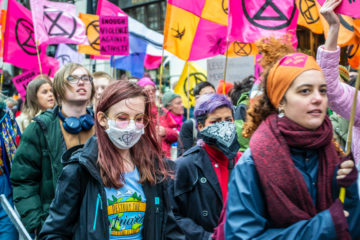Plastic Pollution is Outpacing our Ability to Manage It
Actors around the world have taken up increasingly ambitious strategies to tackle plastic pollution: public-private partnerships like the Circulate Capital Ocean Fund; European Union strategies like banning commonly used- single-use products; and large international conferences like Our Oceans. Still, plastic waste remains a tangible and prominent environmental issue. Policymakers are wondering if the current spate of solutions will be enough to bring us to mitigate plastic waste effectively. In this article, I will examine how much and what kind of effort would be needed to significantly reduce plastic pollution emissions. I leveraged research from The Plastic Pollution Emissions Working Group (PPEG). The PPEG—a team of scientists, policy wonks, and practitioners working together under a grant from the National Socio-Environmental Synthesis …

The Global Inequity of Emissions Consumption: Carbon Accounting as the Future Stepping-Stone in International Climate Negotiations
As the host of the postponed COP26 climate summit, the UK has set out the ambitious goal to convince all countries to commit to reach net zero emissions as soon as possible within their mandatory climate targets. Reducing overall emissions remains the paramount task of global climate governance. However, an overlooked but defining question concerns carbon accounting—the methodology of how national CO2 emissions are assessed. The conventional territory-related production approach, which has traditionally been used in climate governance, stands in contrast to an often ignored consumption-based approach, which more closely captures emissions embodied in the domestic end-use of energy and goods. This article lays out why the seemingly dull and technical matter of carbon accounting has the potential to become the future stepping-stone for a global consensus on …
Mongolia’s Debt Overhang Amidst a Pandemic
As the economic effects of the COVID-19 pandemic unfold, the most severe casualties of “The Great Lockdown” are resource-dependent economies with limited institutional capacity to respond to the crisis. Their supply chains have been cut off, their markets are disrupted, and their investors are crowding out. Many of these countries have high external debt and an obligation to repay it in the medium term or they will face the trilemma of registering a double-digit growth, accruing further debt, or defaulting. Come 2021, Mongolia, a superlatively resource-dependent economy, will be at the center of this trilemma. The immediate cause of Mongolia’s current state is its inconsistent fiscal expenditure and its undiversified mining economy. Over the years, fiscal mismanagement of the previous …

Lockdown and the Climate Crisis
In 2020, lockdowns around the world have reduced energy use and carbon emissions on an unprecedented scale. However, the current COVID-19 outbreak may be a double-edged sword in the fight against climate change. Individual countries are imminently due to report their carbon reductions, as outlined in the United Nations-brokered Paris Agreement. Although pre-Coronavirus crisis global greenhouse gas (GHG) emissions are expected have grown by 1.9%, recent CO₂ calculations in Europe are predicting a surprising scenario: countries may actually hit their stated reduction goals. For instance, the German climate target for 2020, which until February was considered unattainable, should now be met. Due to this year’s mild winter, and, above all, the Coronavirus crisis, the target of 40% CO₂ savings—unlike climate change targets …
Have We Finally Moved Past the Unilateral Age of Apollo? The Artemis Accords, Explained
The United States, under the Trump administration, has aimed to excite interest in space activities, including through the highly publicised creation of the Space Force and the manned space flight missions with SpaceX. Importantly, the announcement of the Artemis Accords in mid-May is an extension of such an effort. The Accords are envisioned as a set of bilateral agreements with the intent to return astronauts to the moon and beyond. Led by the United States and a series of commercial and international partners, they mark a seminal development in the outer space governance regime. As the United States and its international partners venture to create and strengthen outer space governance, non-space faring nations must be included in future agreements to ensure they are not systematically excluded from accessing lunar resources and development opportunities. The Artemis Accords program is spearheaded by the National Aeronautics …
The Health-Security Nexus: Reassessing Priorities after Covid-19
While Covid-19 has spurred debate about the need to elevate public health as a security concern, the securitisation of health presents both opportunities and trade-offs that need to be considered if we are to reallocate military spending to prepare for the next pandemic. The devastating toll of the Coronavirus pandemic has ignited a debate about the intersection of public health and national security. Once recognised as global leaders in pandemic preparedness, the United States and the United Kingdom have struggled to integrate policy responses to Covid-19 into existing security frameworks and to allocate resources accordingly. Indeed, public health spending in both countries pales in comparison to spending on counter-terrorism, even though more American lives have been lost to the pandemic than in all US wars since World War II and the number of Covid-19 deaths in the UK far exceed those attributed to terrorism in the last 50 years. Consequently, some academics and policymakers have questioned whether the prevailing notion of national security—a state’s capacity to defend its territory and …
Coronavirus and the Crisis of State Identity in Belarus
Even after achieving independence, Belarus is still known as the most ‘Russianised’ of the post-Soviet countries. Its unique retention of Soviet structures even after the breakdown of the USSR demonstrates the lack of cohesive state identity in the country. This has allowed Alexander Lukashenko, the country’s first and only president to date, to concentrate more and more power in his own hands. This article argues that Belarus’ crisis of state identity has enabled Lukashenko’s populist and, subsequently, authoritarian nature. Further, the lack of state identity has allowed him to neglect the severity of the Coronavirus pandemic. Belarus’s independence in the post-Cold War era was not a result of a long struggle, which hampered the formation of national identity. In 1991, …
A more global approach to corruption and anti-corruption
Flip the script: stop seeing corruption as a problem affecting exclusively, or mostly, developing countries, and instead recognise and investigate the role of Western financial centres as integral in the puzzle – acknowledging corruption as a global issue. This sentiment, in its various nuances, was reiterated by all the participants to the inaugural workshop of the Testing and evidencing compliance with beneficial ownership checks project, carried out in the frame of the Global Integrity Anti-Corruption Evidence (GI-ACE) research programme, in Oxford, on 9 October 2019. While this relatively simple message is now widely accepted by all serious commentators, having even received some attention with the wider public because of books such as Treasure Islands, Moneyland and the TV series From Russia with Cash, we are still far …









